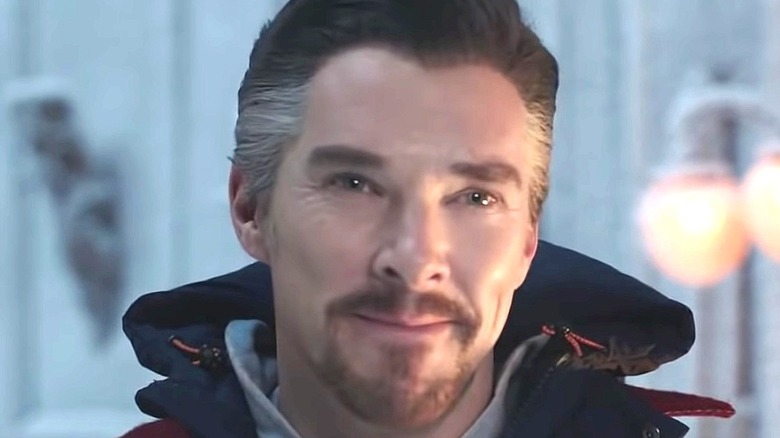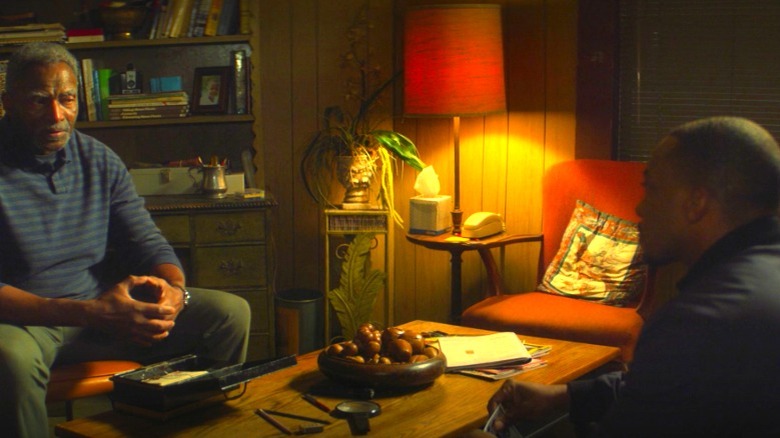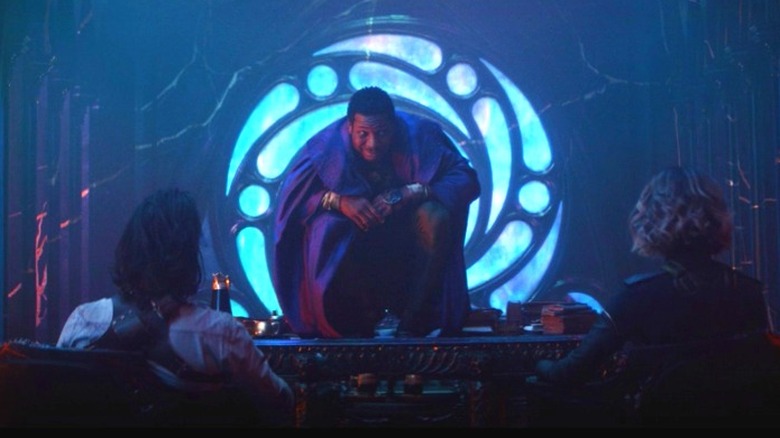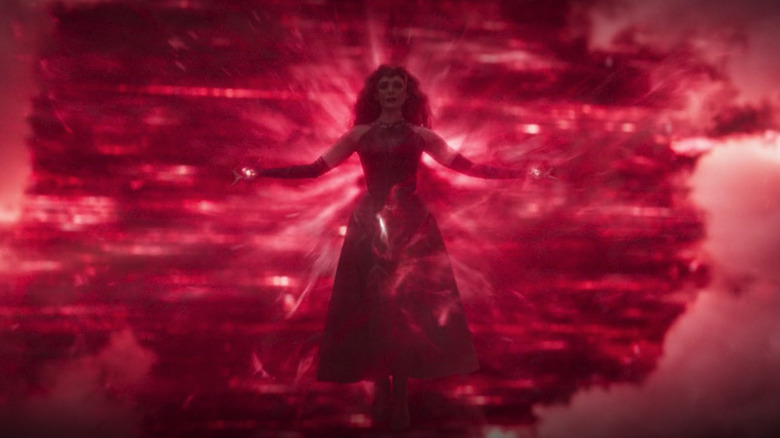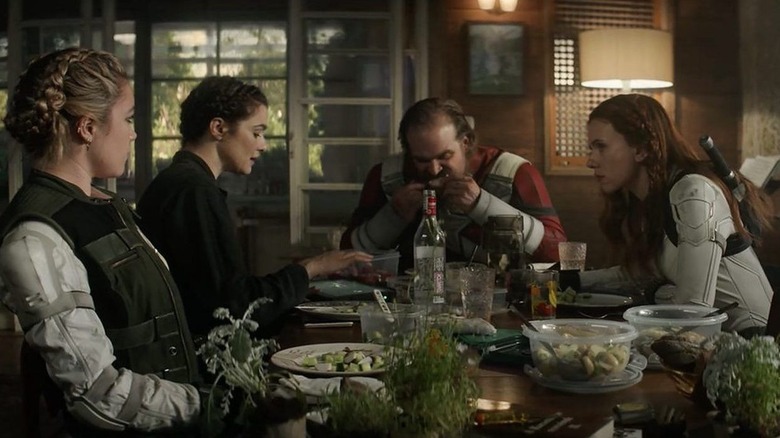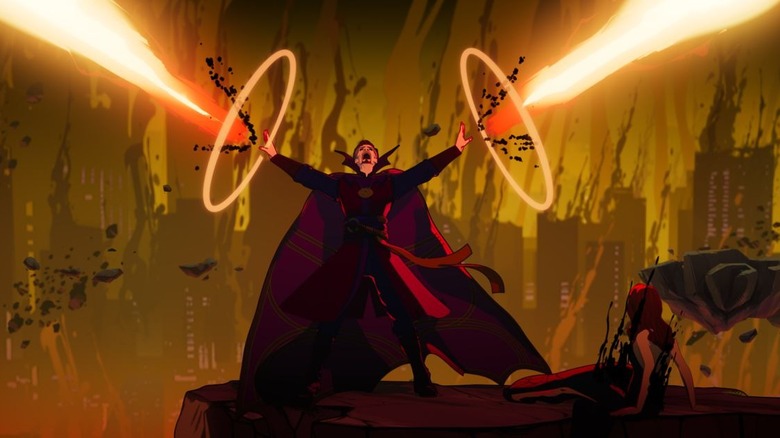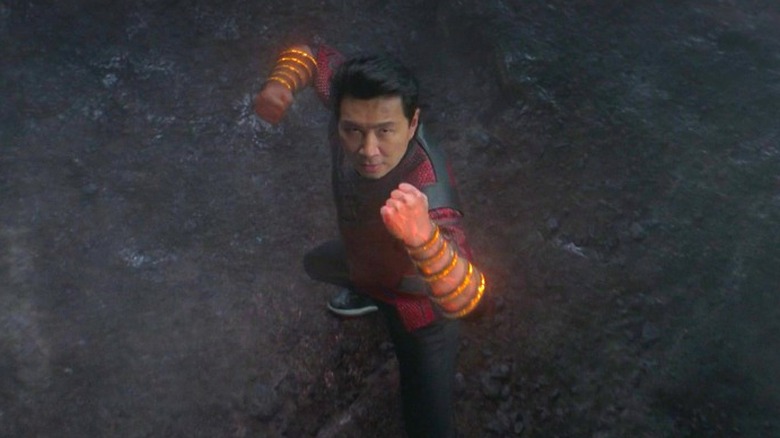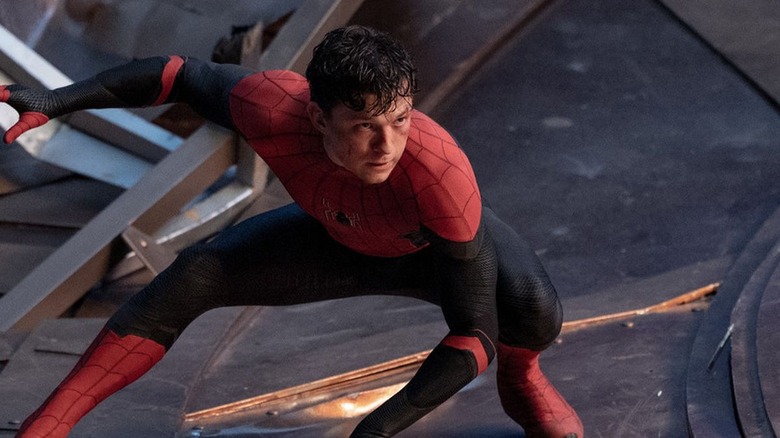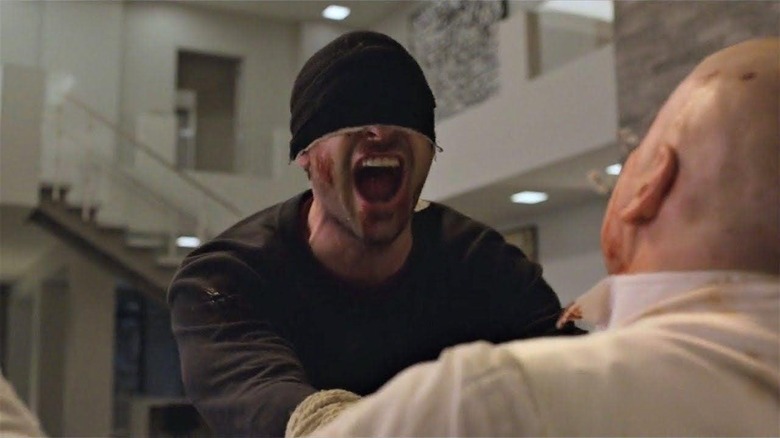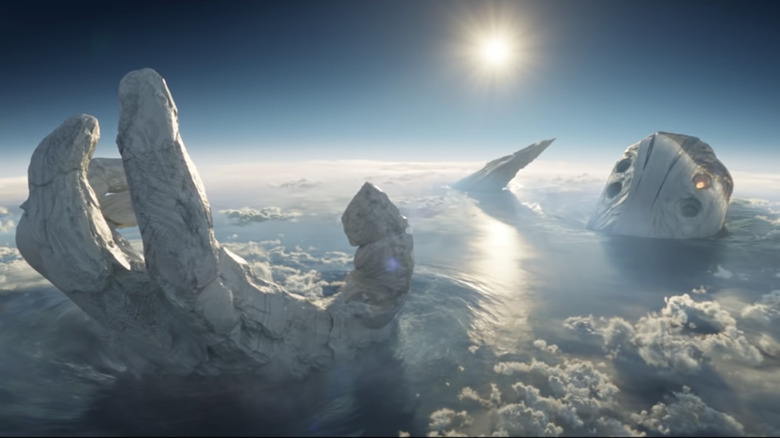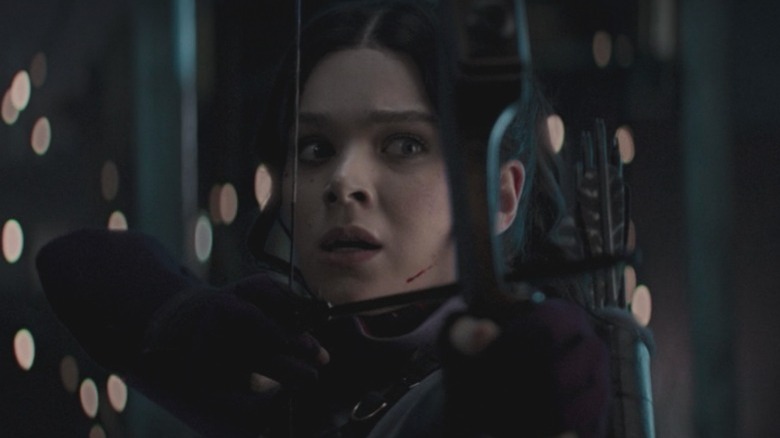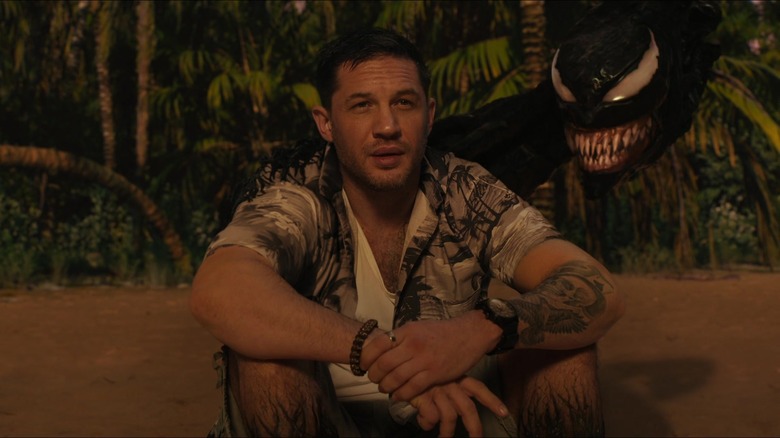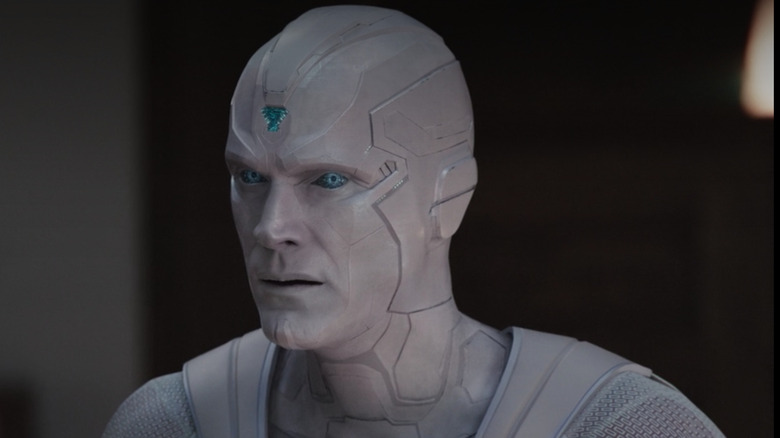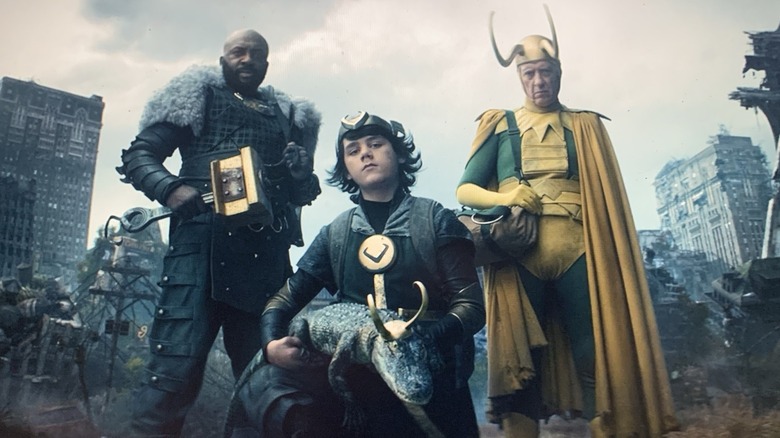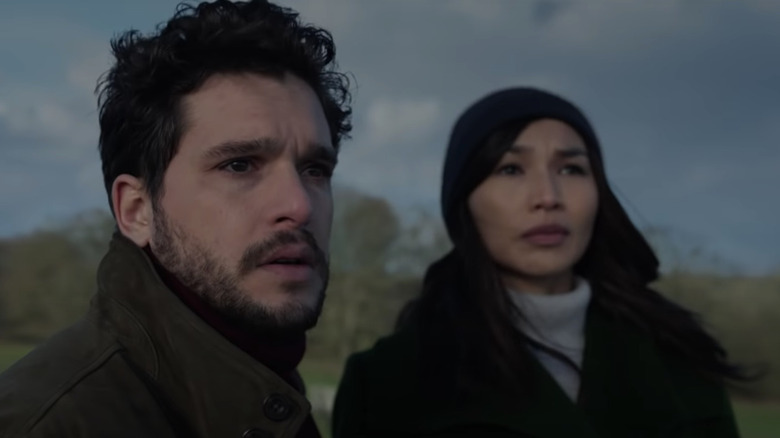The Most Important MCU Scenes From 2021
It was quite the year for the Marvel Cinematic Universe, as 2021 debuted four feature films and five Disney+ series. This is the most content the MCU has ever put out in a year, with 2022 and beyond looking to be even more stuffed (via Insider). We got a taste of everything from these last nine projects, from shocking cameos to explosive storylines that effectively reshaped the MCU as we know it — we're talking to you, multiverse.
The stakes are higher than ever, and these last nine projects were all integral in shaping the MCU going forward — yes, even "Hawkeye." All contained crucial scenes that dramatically impacted not just the movie or series they came from but the MCU as a whole. These scenes ranged from small sit-downs to intergalactic disruptions, each equally important to the fabric of the Marvel Cinematic Universe. Let's take a look back at these big moments — no matter how small they might appear — and examine why they were so crucial to the overarching story and how they impact things moving forward.
Warning: this contains spoilers for every MCU project from 2021.
Sam and Isaiah's sitdown in The Falcon and the Winter Soldier
Sam Wilson (Anthony Mackie) and Isaiah Bradley (Carl Lumbly) meet twice in "The Falcon and the Winter Soldier." When Bucky Barnes (Sebastian Stan) first takes Sam to Isaiah's house, the latter wants nothing to do with either of them, based on his horrible treatment by the U.S. government. When Sam returns to talk to Isaiah in Episode 5 ("Truth"), their conversation goes infinitely better.
Isaiah details how he and his fellow Black soldiers were shot up with the super soldier serum in the '50s but told it was a tetanus shot. Used as guinea pigs, many of them died after not being able to handle the serum. When Isaiah found out that the brass was going to destroy a facility containing the injected soldiers to hide the evidence of an experiment gone wrong, he busted in to save his friends. Subsequently locked up for his heroism for 30 years, he was also routinely experimented on by the government to find out why the serum worked on him.
Their conversation ends with Isaiah telling Sam that this country would never let a Black man be Captain America and suggests no self-respecting Black man would want the title either. This intense conversation between the two heroes is one of the most emotional and, unfortunately, realistic in the 2021 MCU lineup. Not only does Isaiah's story (which is pulled from the comics) draw a sad inspiration from the real-life Tuskegee Experiment, it draws parallels to race relations between Black and white people in the United States.
Loki and Sylvie meeting He Who Remains
The trippy "Loki" changed the MCU in a way no other property had up to that point. After Loki and Sylvie made their way through the Void at the End of Time, they wound up in the Citadel and met one of the most mysterious beings we've seen in a Marvel property. Jonathan Majors is introduced as He Who Remains, the creator of the Time Variance Authority (TVA) and the first variant who came into contact with other variants of himself.
He explained the multiversal war to Loki and Sylvie and said he would need to be replaced as the overseer of the TVA and the Sacred Timeline. Filled with rage, Sylvie murders He, which causes the Sacred Timeline to expand in every direction and effectively fracture the multiverse. Now evil variants are running wild, with He's Kang the Conqueror variant in control of the TVA in the blink of an eye. This entire scene is truly mind-boggling and requires a re-watch or two. While the multiverse has always been there, we have now effectively tapped into it with different timelines branching out and variants of characters we love (and hate) on the loose.
The multiverse is, as Doctor Strange says, "a concept about which we know frighteningly little," so it's hard to grasp the true ramifications of what's happened. But we're sure to learn a whole lot more in "Doctor Strange in the Multiverse of Madness" and "Ant-Man and the Wasp: Quantumania," the latter of which is where Kang will return.
Wanda officially becomes the Scarlet Witch
It finally happened. We all knew Wanda (Elizabeth Olsen) would officially become the Scarlet Witch at some point, but we went almost six years without the mention of the moniker in the MCU. While she's always been one of the most powerful superheroes in the Avengers, she never truly understood just how strong she was — or could be. Agatha (Kathryn Hahn) explains it all to her in "WandaVision," saying, "You're supposed to be a myth. A being capable of spontaneous creation, and here you are, using it to make breakfast for dinner."
The more Wanda understands her power, the stronger she becomes. She now also knows how to use runes, making her all the more terrifying. Officially becoming the Scarlet Witch effectively makes her the most powerful hero in the MCU — although some would argue Captain Marvel might have something to say about that — but she still has some demons to overcome, which makes her that much more of a threat. She is looking to find her boys, who vanished with her dismantling of Westview, but upon hearing their screams in the multiverse, it seems like she's now on a mission to rescue them. We already know there's nothing Wanda won't do to get her happy ending, and with all the power in the world at her fingertips, there's no stopping her.
The family dinner in Black Widow
The full family reunion in "Black Widow" doesn't carry the same weight as most of the other scenes on our list in terms of impact on the MCU, but it's extremely important to Natasha's (Scarlett Johansson) story. Natasha, Yelena (Florence Pugh), Alexei (David Harbour), and Melina (Rachel Weisz) reunite for the first time since the Widows were just girls. This dinner is the melding point for four different character arcs, as Natasha is determined to bring down the Red Room, Alexei dreams of being a superhero again, Yelena yearns for their family bond, and Melina is still focused on her work.
The three eldest members keep denying that they were ever a real family, while a passionate Yelena pushes back, declaring it was always real to her. While they all try to deny it, they are a family, even if they came together for the sake of a mission. The dynamic between the four is important for MCU fans to see, as we've known Natasha so long and pretty much know zilch about her backstory. It's also a wonderful introductory scene for Yelena, who's sure to play a huge part in Marvel shows and films moving forward. It's shocking to think the dinner scene was almost cut from the movie, but thankfully MCU chief Kevin Feige fought to keep it in. The film would be lacking in emotional depth without it.
The creation of Strange Supreme
The debut season of "What If...?" focused on single MCU moments that were altered just enough to change the entire world. In Episode 4 ("What If...Doctor Strange Lost His Heart Instead of His Hands?"), Stephen Strange's story was changed by him losing Christine (Rachel McAdams) in a car accident rather than the use of his hands.
This had absolutely catastrophic ramifications, only because Doctor Strange wouldn't stop rewinding time with the Eye of Agamotto to try and prevent Christine's death. The Ancient One steps in to teach Stephen (but mostly us) about Absolute Points in time and says Christine has to die in our universe or the fabric of reality will dissolve. Stephen can't accept this and seeks to become a more powerful being by absorbing the energy of different mythical creatures. Becoming Strange Supreme, he is successful in saving his love's life, but within seconds, his universe starts to collapse like a dying star. It was all for naught.
Doctor Strange becoming Strange Supreme is so important because the animated character seems to move over to live-action in the "Multiverse of Madness" trailer at the end of "Spider-Man: No Way Home." Possibly the worst character from "What If...?" to cross over, Strange Supreme's ego and creation are vastly dangerous for this new reality, and the hell he might unleash could be unfathomable.
Shang-Chi becomes the owner of the Ten Rings
Easily the underdog of MCU films in 2021, "Shang-Chi and the Legend of the Ten Rings" blew many moviegoers away with its incredible fight sequences and satisfying story. If "Spider-Man: No Way Home" didn't show up, it very well could have been the best Marvel film of the year. Serving as an origin story, "Shang-Chi" introduced the world to the new hero, whose biggest adversary is his father, Wenwu (Tony Leung). The dangerous keeper of the mythical Ten Rings, Wenwu, aka the Mandarin, has become corrupted by dangerous forces trying to break through into our world.
To stop the soul-sucking Dweller-in-the-Darkness from, well, sucking souls, Shang-Chi (Simu Liu) must battle his father. Shang-Chi defeats Wenwu, and just as the latter is having the life drained from him by the great beast, he bequeaths the Ten Rings to his son. There is still much to be learned about these mysterious artifacts, but they appear to be one of the more powerful weapons in the MCU. Now that Shang-Chi is equipped with them, he is in a greater league of heroes and in complete control of a force we still have much to learn about.
The three Spider-Men meet
"Spider-Man: No Way Home" was important on so many levels, and it didn't just impact the MCU but the superhero genre as a whole. There are plenty of moments to dissect here, but easily one of the most significant scenes is the first meeting of all three Spider-Men. When Tobey Maguire and Andrew Garfield's webslingers meet Peter Parker (Tom Holland) on the roof of his school, we're literally witnessing movie history. Three actors who have played the same character in three completely separate movie franchises meeting one another is still as mind-boggling as it sounds. This is literally like Sean Connery, Pierce Brosnan, and Daniel Craig meeting up to all play Bond in the same film. It's beautiful nonsense.
While this scene is pivotal to Peter 1's arc, it's so much more important to the MCU — and other comic book universes — because it has completely broken all the rules and allows for anything moving forward. Nothing is off-limits. Nothing can't be done. Nothing will stop Kevin Feige. This scene brings a lot of hope for the introduction of the X-Men into the MCU, as well as the Fantastic Four. "Doctor Strange in the Multiverse of Madness" is also likely to break some rules — we might have round two of "No Way Home" cameo chaos on our hands.
Daredevil and Kingpin's arrivals in the MCU
It took until December 2021, but some Marvel Netflix characters finally appeared in some MCU properties — within the same week of each other. Charlie Cox's Matt Murdock and Vincent D'Onofrio's Kingpin debuted in "Spider-Man: No Way Home" and "Hawkeye," respectively, which is another monumental moment for the MCU. Their debut scenes kind of fall in line with the two extra Spideys showing up in "No Way Home," in that we now welcome all superheroes into the MCU with open arms. At this point, we might as well welcome in Henry Cavill's Superman since Warner Brothers doesn't seem interested in bringing him back.
Daredevil and Kingpin's transition into the MCU is pivotal because now there is no more arguing about whether they existed here in the first place. Depending on who you talked to, or who you wanted to argue with, there was always debate about whether the Netflix heroes fell under the MCU umbrella. They did. They just didn't really acknowledge each other. Now they're here, now they're home, and their introduction effectively means all other Netflix Marvel stars belong in the MCU as well. This includes Jessica Jones (Krysten Ritter), Luke Cage (Mike Colter), and that guy from that other show.
The Eternals stop the Emergence
"Eternals" might just be the biggest disappointment of the year — not just for the MCU, but for movies in general. Somehow the Chloé Zhao-directed flick became the lowest-rated Marvel Studios film ever on Rotten Tomatoes, proving that beauty alone is not enough to make up for lack of substance. Despite this, the finale of "Eternals" will surely have some serious ramifications for the MCU going forward. You can't anger one of the most powerful beings in existence and think you can take a stroll in the park with the King in the North like nothing happened. Right Sersi?
After the Eternals stop the emergence, much to the chagrin of Ikaris (Richard Madden), Arishem is mad as hell. The giant robot-looking Celestial has just been overruled by products of his own creation, and now several thousand years of hard work have been wasted. Arishem lets Sersi (Gemma Chan), Phastos (Brian Tyree Henry), and Kingo (Kumail Nanjiani) know he will scan their 7,000 years' worth of memories to see if the human race is worth saving and will then pass his judgment upon them and our world. The fate of the MCU is literally in Arishem's hands, and we don't suspect all of human history will convince him to keep us around.
Kate Bishop hesitates on firing at Yelena
It's a short, seemingly unimportant moment in "Hawkeye," but it earns a well-deserved spot on our list. In Episode 4 ("Partners, Am I Right?") of the Disney+ series, Yelena shows up and tries to take out Clint Barton (Jeremy Renner) on a rooftop while Kate Bishop (Hailee Steinfeld) fights Echo (Alaqua Cox). When Yelena removes her mask, she looks directly at Kate. Something comes over the archer, who drops her bow as she looks back at this mysterious assassin. She had a clear shot, but she chose not to take it.
This is so important because it's a direct parallel to the relationship between Clint and Natasha. He was sent to kill the Black Widow over a decade ago, but he stopped himself when he was about to take his shot. He made another call, and it turned out to be one of the best decisions of his life. Clint clearly saw something in Natasha that others didn't and knew there was good in her, beginning a long and mostly happy friendship. We very much expect this to be the trajectory for Kate and Yelena, who also have a fantastic back-and-forth in Episode 5 ("Ronin"). The two women are set to be the MCU's new besties, replacing the emptiness left in the friend void now that Steve-Sam-Bucky and Natasha-Clint are no longer things.
Venom officially crosses over into the MCU
As if we needed more outsiders joining the MCU this year, Eddie Brock officially crossed over from the Sony universe in the mid-credits scene of "Spider-Man: No Way Home." We knew something funky was happening thanks to the mid-credits scene in "Venom: Let There Be Carnage," which also dragged Tom Holland into Sony land. We're still not sure what the hell is going on here, but it definitely is important. It appears as if Eddie and Venom were pulled into our world with the rest of the former Spider-Man villains during Doctor Strange's botched spell. However, when his second successful spell works, Eddie and his buddy are sent back to where they came from — but not before leaving a tiny little sliver of symbiote behind at a Mexican bar.
Why is this important? It lets us know that these two different universes are effectively being tied together. Sure, it was taken away from us within moments of being given to us, but Tom Hardy's Eddie Brock and Venom are now officially MCU canon, and that's something to be excited about. When Spider-Man and the twosome meet is still up in the air, and let's not forget the wrench the definitely-not-going-to-let-us-down "Morbius" will throw into the mix. We just know that something is coming as the multiverse pulls together the two most unlikely things: the MCU and whatever the hell the Sony Spider-Man Universe is.
The creation of White Vision
The MCU isn't quite ready to quit Paul Bettany yet, so they concocted a way to give us another version of Vision — presumably just to kill him off again in about two years. Since the Vision we first see in "WandaVision," is just a construct of Wanda's mind, an actual tangible robot needed to be created to carry on the legacy. Thanks to the good folks at S.W.O.R.D, a deadly Vision was created out of dead Vision's body to kill a not-killable-kinda-dead Vision. This new synthezoid is white, terrifying and without sentiment.
The two Visions have a face-to-face battle which is quite a joy to watch, with our Vision effectively passing his subconscious onto White Vision, who takes off after the influx of knowledge and memories into his wiry brain. Since White Vision takes off immediately, we're not sure what effect the memory transfer has on him. We see all the great moments Vision and Wanda shared during the syncing and some of the more terrible times, like the Thanos (Josh Brolin) problem. This scene lets Vision live on in the MCU as more than a memory, and he might become a lifeline for Wanda. The duo might be able to get their happy ending after all, but we don't suspect any time soon.
The introduction of variants
In the book of MCU terminology, there might not be a more important entry than "Variants." The word was introduced to us in the first episode of "Loki," and throughout the Disney+ extravaganza, we learned more and more about what variants are and why we should be so terrified of them. Miss Minutes is the first to teach us about them, and her blasé description of them makes them seem like they're not so bad. But sometimes, they very much are.
Variants are those who veer off the Sacred Timeline, a path created by the Time Keepers. Stepping off one's predetermined path creates a Nexus Event, which can start a multiversal war. The TVA can reset the timeline, but Variants are arrested and judged ... and, more often than not, sent to die in the Void at the End of Time.
The introduction of variants by Miss Minutes and the subsequent appearance of Loki variants throughout the series has us questioning everyone and everything we see in the MCU going forward.
Eternals post-credits scenes
The "Eternals" post-credits scenes were arguably more exciting than the two hours that came before them, introducing us to two thrilling new characters in a matter of minutes and giving us a closer look at one we've already briefly met. In the mid-credits scene, the fleeing Eternals meet Eros, the brother of Thanos, who, of course, is played by the famous one from One Direction (Harry Styles). How Eros fits into the story going forward has yet to be unveiled, but there will certainly be many questions about his genocidal big brother.
We're also given a tease of Dane Whitman's (Kit Harington) Black Knight and his epic Ebony Blade. Just as Dane is about to pick up the mysterious weapon, we hear Mahershala Ali's voice off-screen. "Sure you're ready for that, Mr. Whitman?" he asks. Ali is playing Blade in the MCU, and while we don't get to see him in the "Eternals" post-credit scene, it was a thrill nonetheless. The teases of these three characters in the end-credits scenes are intriguing, and we're left as curious about their future as those of the surviving Eternals.
